Thomas James Richards, Diaries, Transcript Vol. 2 - Part 24
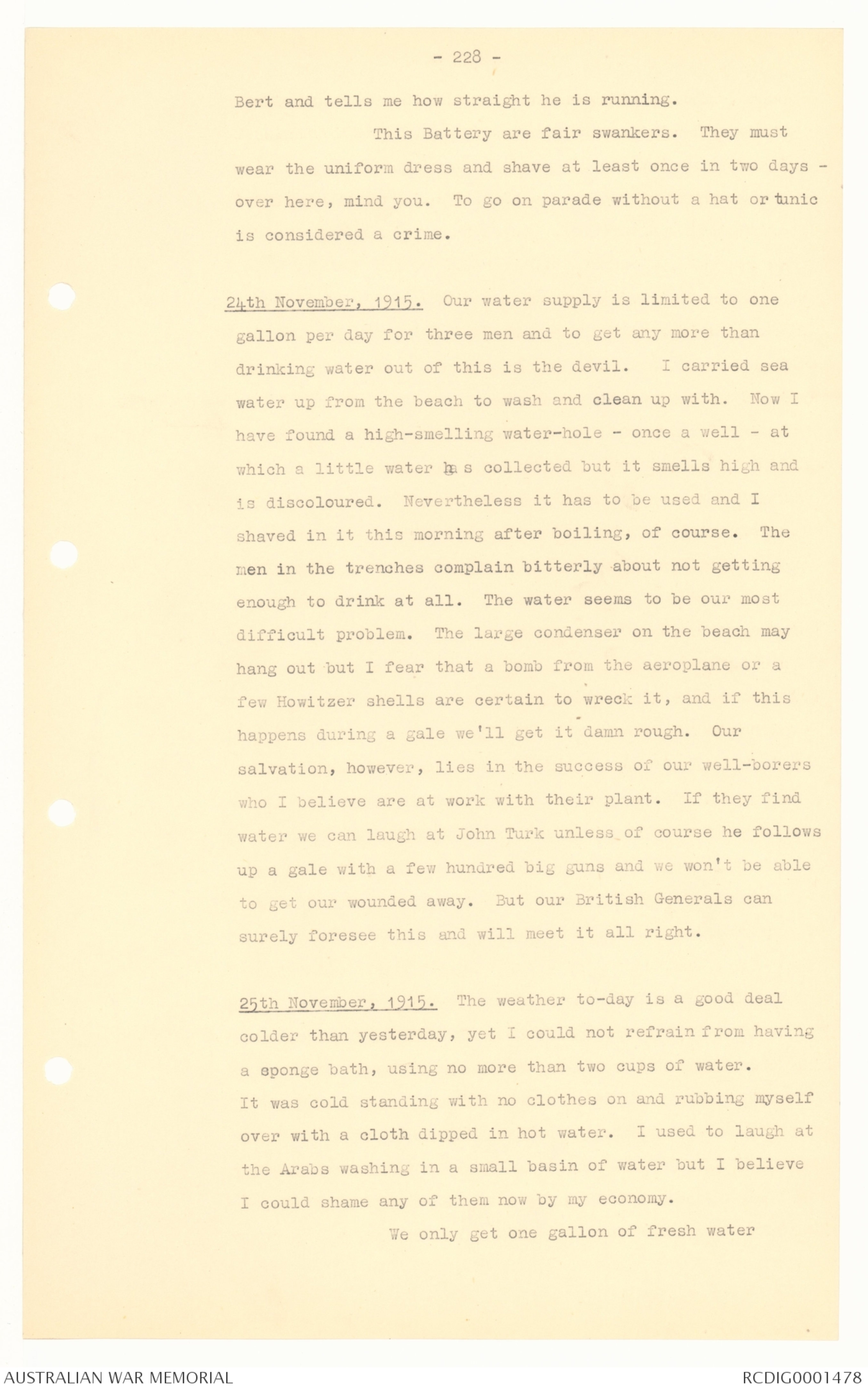
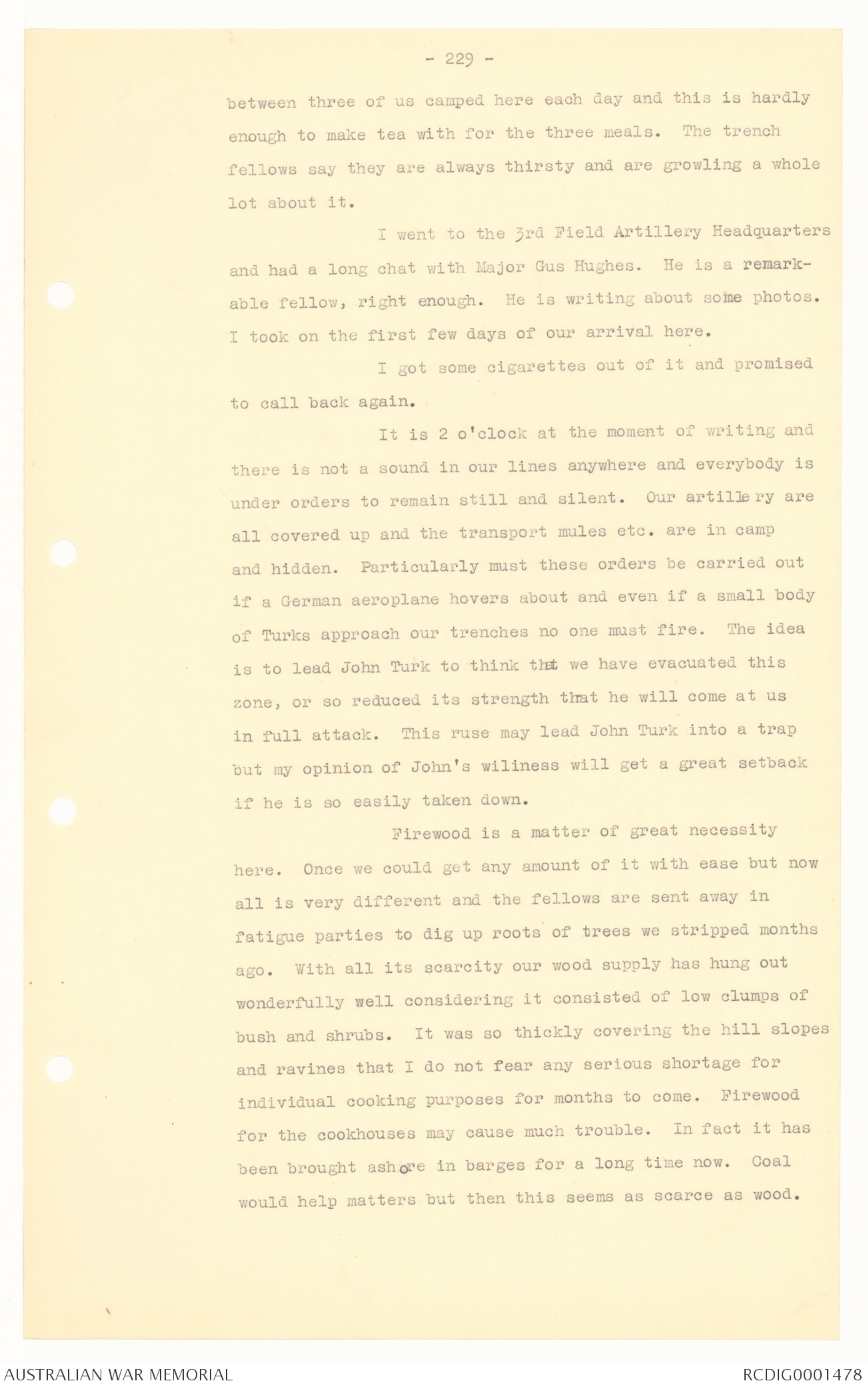
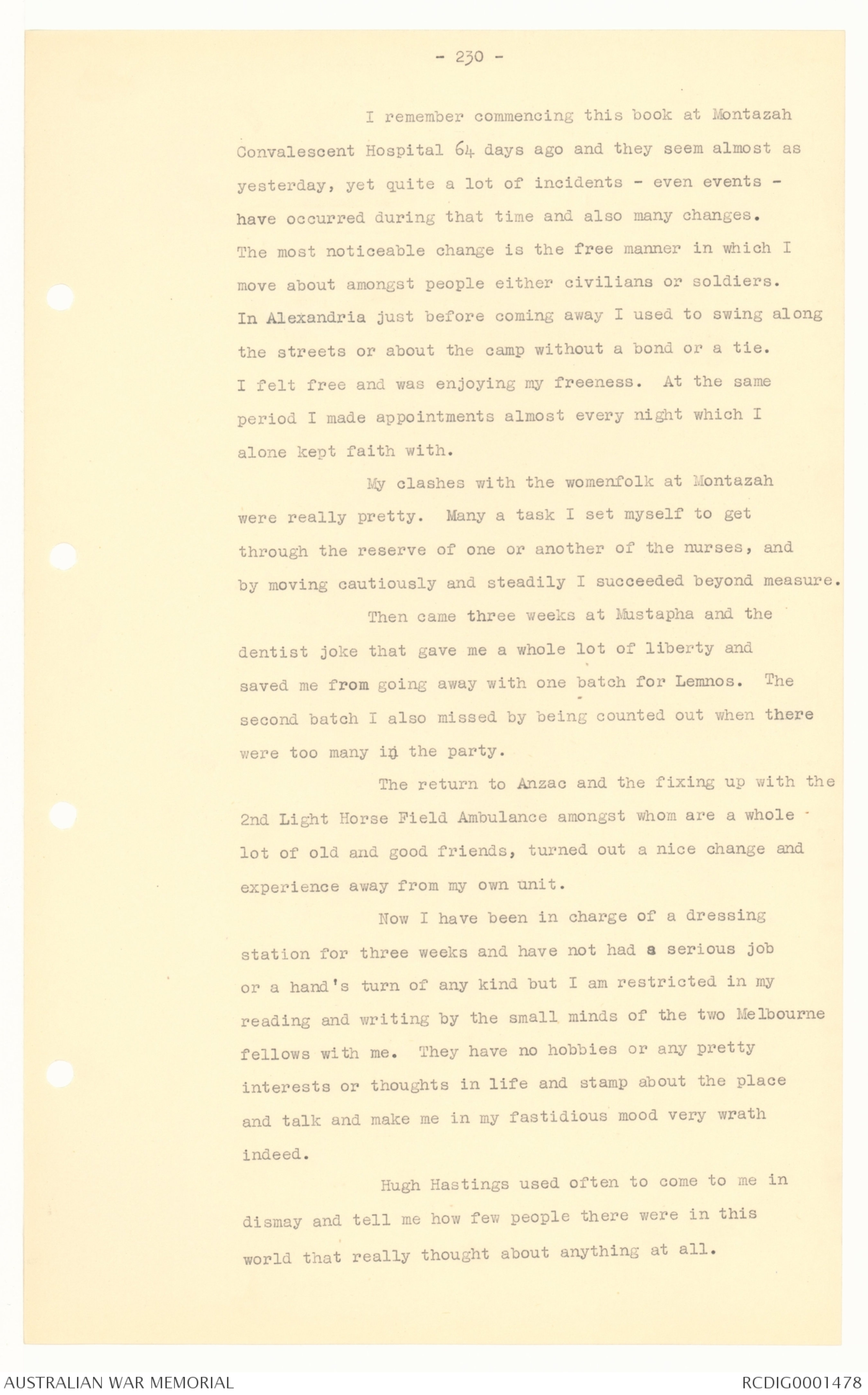
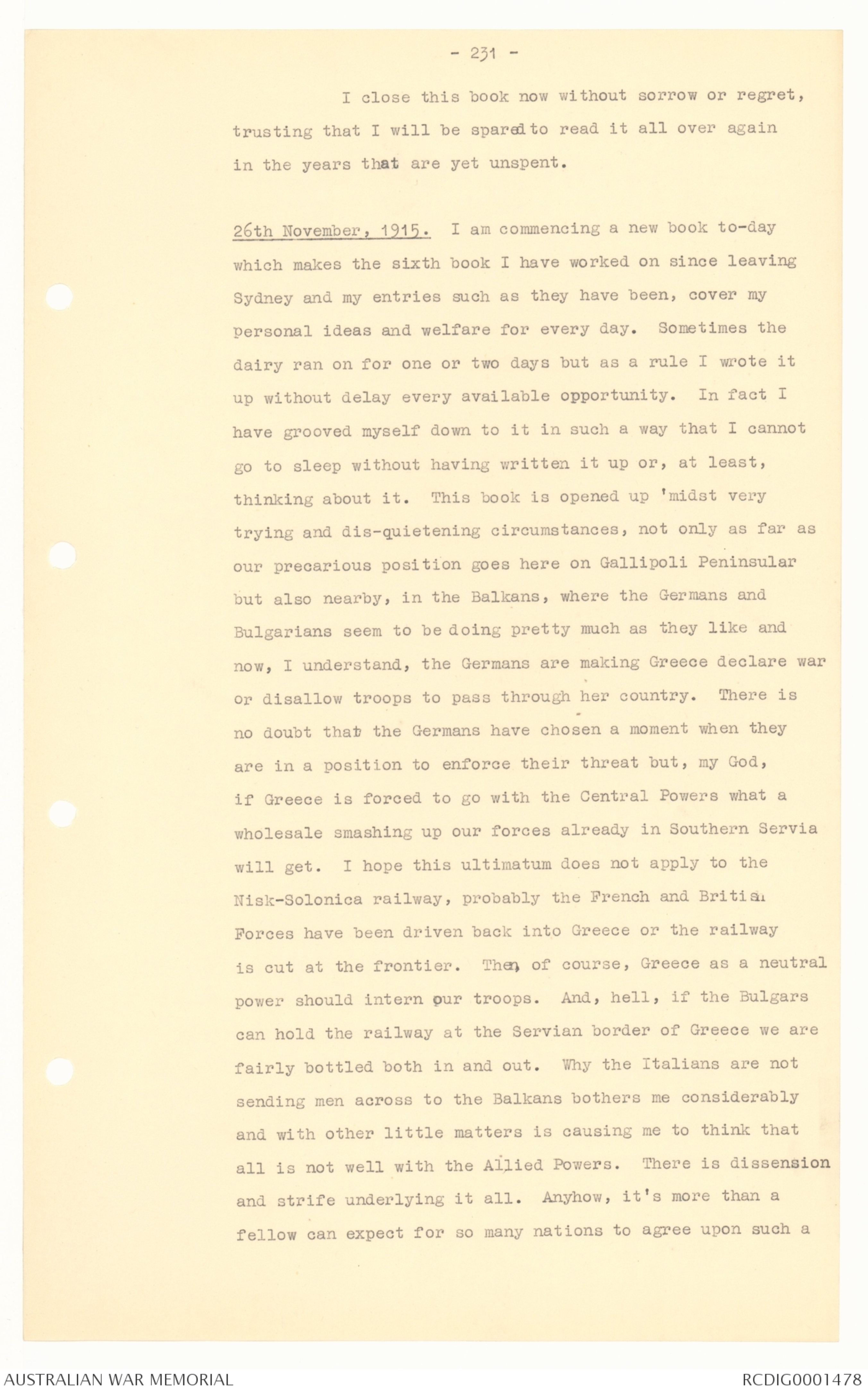
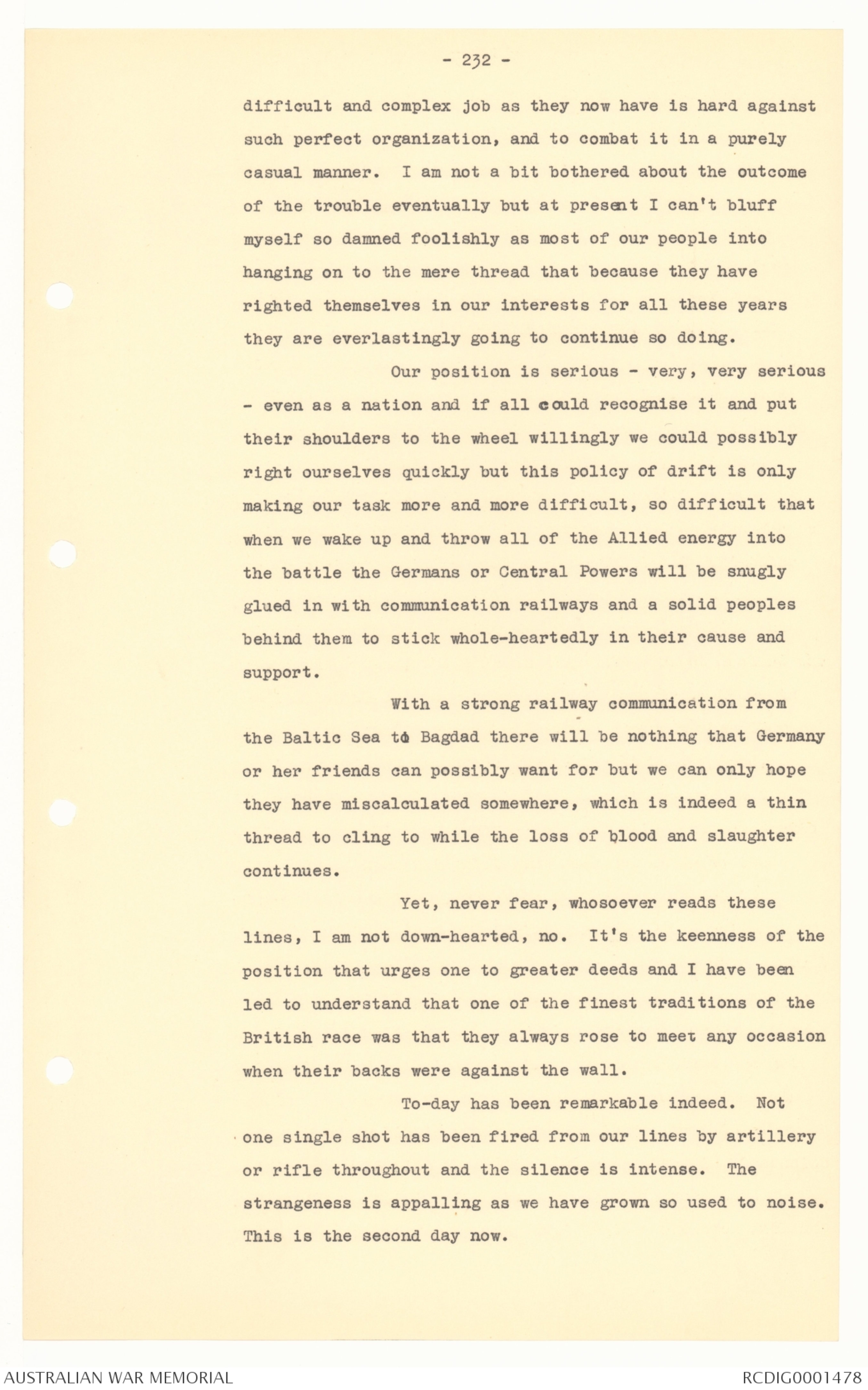
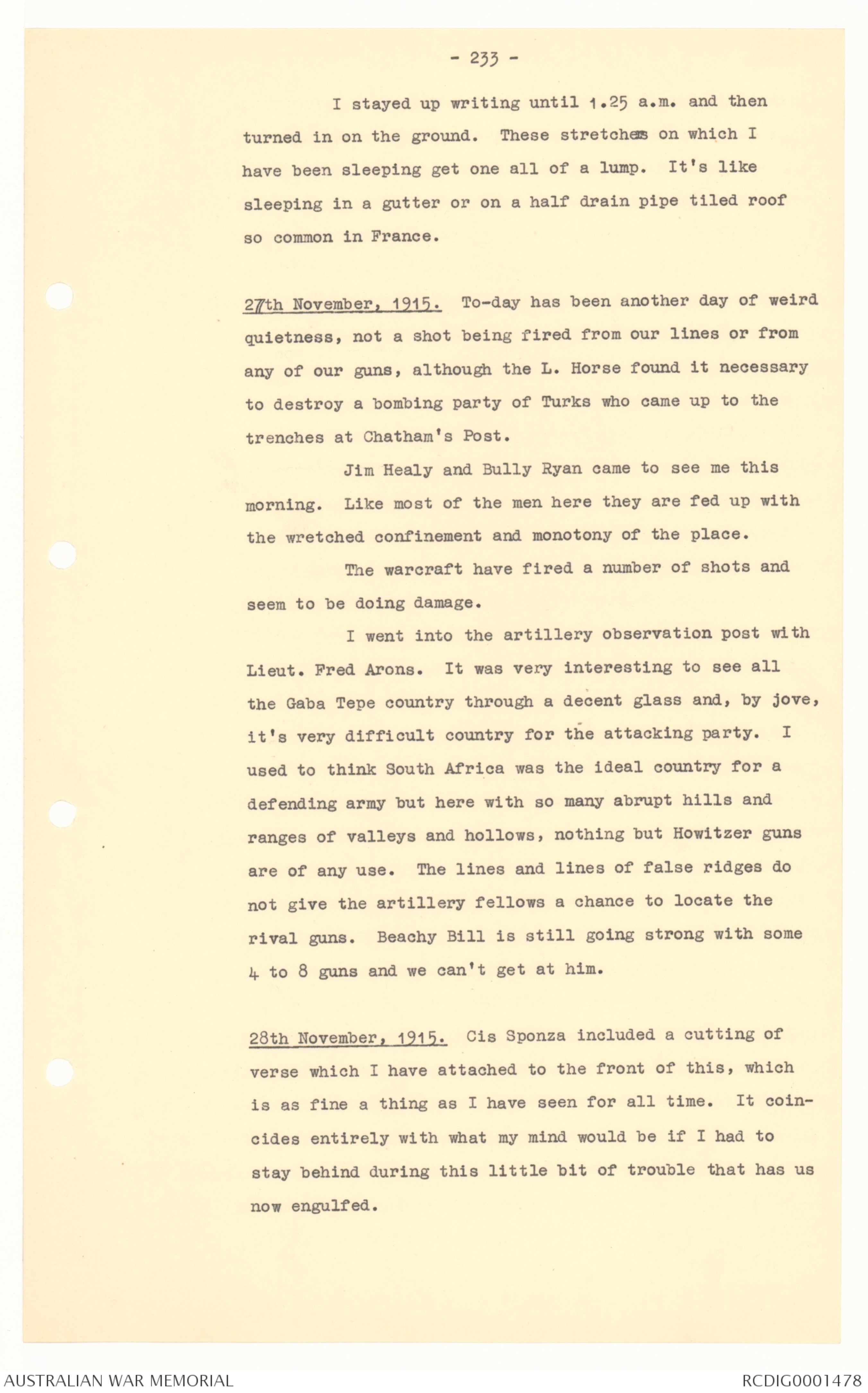
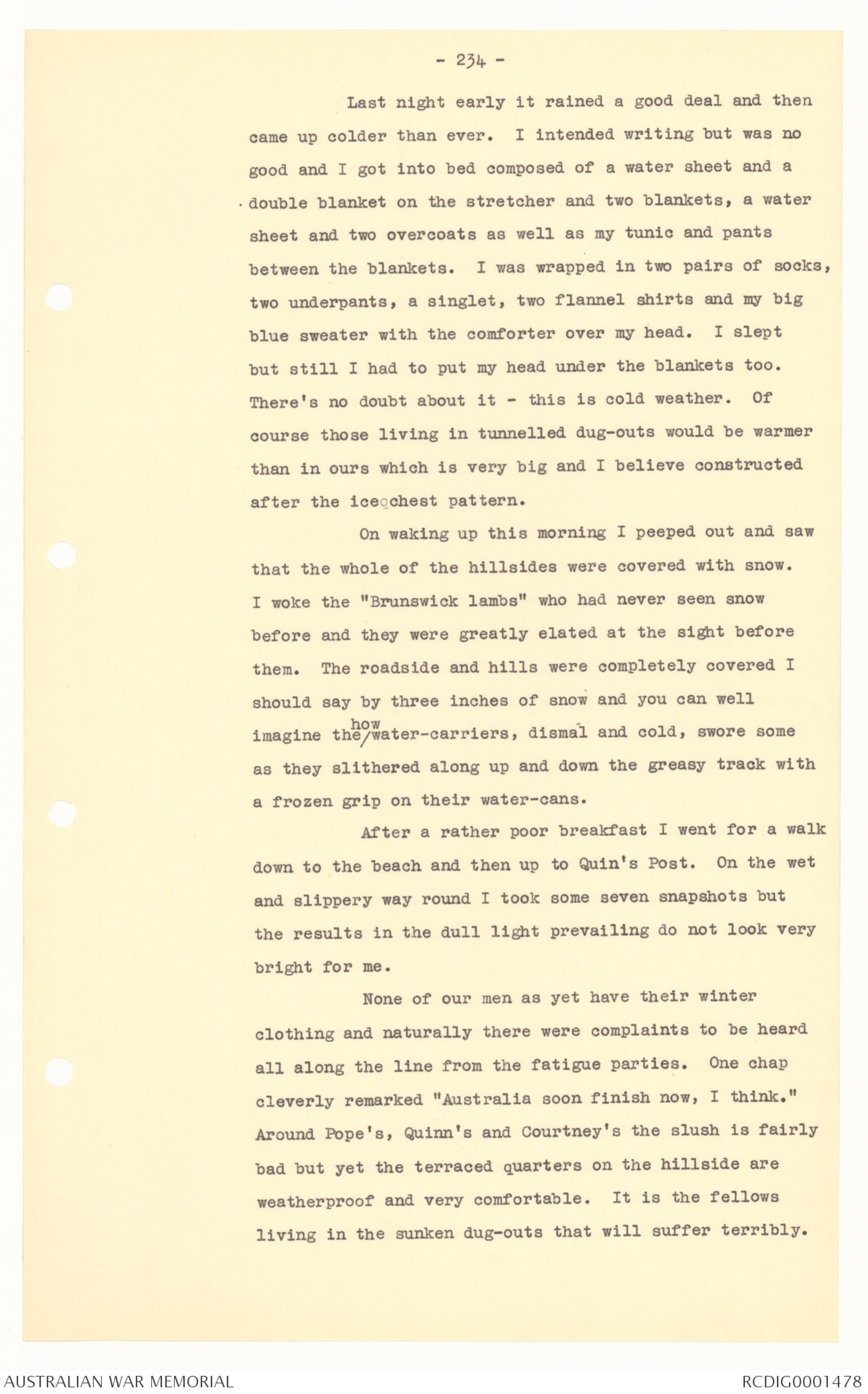



- 228 -
Bert and tells me how straight he is running.
This Battery are fair swankers. They must
wear the uniform dress and shave at least once in two days -
over here, mind you. To go on parade without a hat or tunic
is considered a crime.
24th November, 1915. Our water supply is limited to one
gallon per day for three men and to get any more than
drinking water out of this is the devil. I carried sea
water up from the beach to wash and clean up with. Now I
have found a high-smelling water-hole - once a well - at
which a little water has collected but it smells high and
is discoloured. Nevertheless it has to be used and I
shaved in it this morning after boiling, of course. The
men in the trenches complain bitterly about not getting
enough to drink at all. The water seems to be our most
difficult problem. The large condenser on the beach may
hang out but I fear that a bomb from the aeroplane or a
few Howitzer shells are certain to wreck it, and if this
happens during a gale we'll get it damn rough. Our
salvation, however, lies in the success of our well-borers
who I believe are at work with their plant. If they find
water we can laugh at John Turk unless of course he follows
up a gale with a few hundred big guns and we won’t be able
to get our wounded away. But our British Generals can
surely foresee this and will meet it all right.
25th November, 1915. The weather to-day is a good deal
colder than yesterday, yet I could not refrain from having
a sponge bath, using no more than two cups of water.
It was cold standing with no clothes on and rubbing myself
over with a cloth dipped in hot water. I used to laugh at
the Arabs washing in a small basin of water but I believe
I could shame any of them now by my economy.
We only get one gallon of fresh water
- 229 -
between three of us camped here each day and this is hardly
enough to make tea with for the three meals. The trench
fellows say they are always thirsty and are growling a whole
lot about it.
I went to the 3rd Field Artillery Headquarters
and had a long chat with Major Gus Hughes. He is a remarkable
fellow, right enough. He is writing about some photos.
I took on the first few days of our arrival here.
I got some cigarettes out of it and promised
to call back again.
It is 2 o'clock at the moment of writing and
there is not a sound in our lines anywhere and everybody is
under orders to remain still and silent. Our artillery are
all covered up and the transport mules etc. are in camp
and hidden. Particularly must these orders be carried out
if a German aeroplane hovers about and even if a small body
of Turks approach our trenches no one must fire. The idea
is to lead John Turk to think that we have evacuated this
zone, or so reduced its strength that he will come at us
in full attack. This ruse may lead John Turk into a trap
but my opinion of John's wiliness will get a great setback
if he is so easily taken down.
Firewood is a matter of great necessity
here. Once we could get any amount of it with ease but now
all is very different and the fellows are sent away in
fatigue parties to dig up roots of trees we stripped months
ago. With all its scarcity our wood supply has hung out
wonderfully well considering it consisted of low clumps of
bush and shrubs. It was so thickly covering the hill slopes
and ravines that I do not fear any serious shortage for
individual cooking purposes for months to come. Firewood
for the cookhouses may cause much trouble. In fact it has
been brought ashore in barges for a long time now. Coal
would help matters but then this seems as scarce as wood.
- 230 -
I remember commencing this book at Montazah
Convalescent Hospital 64 days ago and they seem almost as
yesterday, yet quite a lot of incidents - even events -
have occurred during that time and also many changes.
The most noticeable change is the free manner in which I
move about amongst people either civilians or soldiers.
In Alexandria just before coming away I used to swing along
the streets or about the camp without a bond or a tie.
I felt free and was enjoying my freeness. At the same
period I made appointments almost every night which I
alone kept faith with.
My clashes with the womenfolk at Montazah
were really pretty. Many a task I set myself to get
through the reserve of one or another of the nurses, and
by moving cautiously and steadily I succeeded beyond measure.
Then came three weeks at Mustapha and the
dentist joke that gave me a whole lot of liberty and
saved me from going away with one batch for Lemnos. The
second batch I also missed by being counted out when there
were too many in the party.
The return to Anzac and the fixing up with the
2nd Light Horse Field Ambulance amongst whom are a whole
lot of old and good friends, turned out a nice change and
experience away from my own unit.
Now I have been in charge of a dressing
station for three weeks and have not had a serious job
or a hand's turn of any kind but I am restricted in my
reading and writing by the small minds of the two Melbourne
fellows with me. They have no hobbies or any pretty
interests or thoughts in life and stamp about the place
and talk and make me in my fastidious mood very wrath
indeed.
Hugh Hastings used often to come to me in
dismay and tell me how few people there were in this
world that really thought about anything at all.
- 231 -
I close this book now without sorrow or regret,
trusting that I will be spared to read it all over again
in the years that are yet unspent.
26th November, 1915. I am commencing a new book to-day
which makes the sixth book I have worked on since leaving
Sydney and my entries such as they have been, cover my
personal ideas and welfare for every day. Sometimes the
dairy ran on for one or two days but as a rule I wrote it
up without delay every available opportunity. In fact I
have grooved myself down to it in such a way that I cannot
go to sleep without having written it up or, at least,
thinking about it. This book is opened up 'midst very
trying and dis-quietening circumstances, not only as far as
our precarious position goes here on Gallipoli Peninsular
but also nearby, in the Balkans, where the Germans and
Bulgarians seem to be doing pretty much as they like and
now, I understand, the Germans are making Greece declare war
or disallow troops to pass through her country. There is
no doubt that the Germans have chosen a moment when they
are in a position to enforce their threat but, my God,
if Greece is forced to go with the Central Powers what a
wholesale smashing up our forces already in Southern Servia
will get. I hope this ultimatum does not apply to the
Nisk-Solonica railway, probably the French and British
Forces have been driven back into Greece or the railway
is cut at the frontier. Then of course, Greece as a neutral
power should intern our troops. And, hell, if the Bulgars
can hold the railway at the Servian border of Greece we are
fairly bottled both in and out. Why the Italians are not
sending men across to the Balkans bothers me considerably
and with other little matters is causing me to think that
all is not well with the Allied Powers. There is dissension
and strife underlying it all. Anyhow, it's more than a
fellow can expect for so many nations to agree upon such a
- 232 -
difficult and complex job as they now have is hard against
such perfect organization, and to combat it in a purely
casual manner. I am not a bit bothered about the outcome
of the trouble eventually but at present I can't bluff
myself so damned foolishly as most of our people into
hanging on to the mere thread that because they have
righted themselves in our interests for all these years
they are everlastingly going to continue so doing.
Our position is serious - very, very serious
- even as a nation and if all could recognise it and put
their shoulders to the wheel willingly we could possibly
right ourselves quickly but this policy of drift is only
making our task more and more difficult, so difficult that
when we wake up and throw all of the Allied energy into
the battle the Germans or Central Powers will be snugly
glued in with communication railways and a solid peoples
behind them to stick whole-heartedly in their cause and
support.
With a strong railway communication from
the Baltic Sea to Bagdad there will be nothing that Germany
or her friends can possibly want for but we can only hope
they have miscalculated somewhere, which is indeed a thin
thread to cling to while the loss of blood and slaughter
continues.
Yet, never fear, whosoever reads these
lines, I am not down-hearted, no. It's the keenness of the
position that urges one to greater deeds and I have been
led to understand that one of the finest traditions of the
British race was that they always rose to meet any occasion
when their backs were against the wall.
To-day has been remarkable indeed. Not
one single shot has been fired from our lines by artillery
or rifle throughout and the silence is intense. The
strangeness is appalling as we have grown so used to noise.
This is the second day now.
- 233-
I stayed up writing until 1.25 a.m. and then
turned in on the ground. These stretchers on which I
have been sleeping get one all of a lump. It's like
sleeping in a gutter or on a half drain pipe tiled roof
so common in France.
27th November, 1915. To-day has been another day of weird
quietness, not a shot being fired from our lines or from
any of our guns, although the L. Horse found it necessary
to destroy a bombing party of Turks who came up to the
trenches at Chatham's Post.
Jim Healy and Bully Ryan came to see me this
morning. Like most of the men here they are fed up with
the wretched confinement and monotony of the place.
The warcraft have fired a number of shots and
seem to be doing damage.
I went into the artillery observation post with
Lieut. Fred Arons. It was very interesting to see all
the Gaba Tepe country through a decent glass and, by jove,
it's very difficult country for the attacking party. I
used to think South Africa was the ideal country for a
defending army but here with so many abrupt hills and
ranges of valleys and hollows, nothing but Howitzer guns
are of any use. The lines and lines of false ridges do
not give the artillery fellows a chance to locate the
rival guns. Beachy Bill is still going strong with some
4 to 8 guns and we can't get at him.
28th November, 1915. Cis Sponza included a cutting of
verse which I have attached to the front of this, which
is as fine a thing as I have seen for all time. It coincides
entirely with what my mind would be if I had to
stay behind during this little bit of trouble that has us
now engulfed.
- 234 -
Last night early it rained a good deal and then
came up colder than ever. I intended writing but was no
good and I got into bed composed of a water sheet and a
double blanket on the stretcher and two blankets, a water
sheet and two overcoats as well as my tunic and pants
between the blankets. I was wrapped in two pairs of socks,
two underpants, a singlet, two flannel shirts and my big
blue sweater with the comforter over my head. I slept
but still I had to put my head under the blankets too.
There's no doubt about it - this is cold weather. Of
course those living in tunnelled dug-outs would be warmer
than in ours which is very big and I believe constructed
after the ice chest pattern.
On waking up this morning I peeped out and saw
that the whole of the hillsides were covered with snow.
I woke the "Brunswick lambs" who had never seen snow
before and they were greatly elated at the sight before
them. The roadside and hills were completely covered I
should say by three inches of snow and you can well
imagine the /how water-carriers, dismal and cold, swore some
as they slithered along up and down the greasy track with
a frozen grip on their water-cans.
After a rather poor breakfast I went for a walk
down to the beach and then up to Quin's Post. On the wet
and slippery way round I took some seven snapshots but
the results in the dull light prevailing do not look very
bright for me.
None of our men as yet have their winter
clothing and naturally there were complaints to be heard
all along the line from the fatigue parties. One chap
cleverly remarked "Australia soon finish now, I think."
Around Pope's, Quinn's and Courtney's the slush is fairly
bad but yet the terraced quarters on the hillside are
weatherproof and very comfortable. It is the fellows
living in the sunken dug-outs that will suffer terribly.
- 235 -
Lots of units have drawn their winter clothes this
morning so I suppose all will come well now. I fancy the
snow arrived much earlier than was expected, and very few
of us have any more than the summer stuff issued months ago.
There are even a lot of short-knee pants about and the men
can't procure any long ones. This is a damned shame,
right enough but the fact that we have winter clothes in
the stores is encouraging. About all I would like is a
pair of big waterproof boots as I have plenty of other
woollen gear about but as they are issuing long rubber-
coated boots the tops of some of which come to the hips,
I might be alright yet, although the trench men should be
supplied first.
I used to laugh at the thought of it snowing over
here as the vegetation, insects, lizards and birds made me
think snow was never common here but I have to change my
idea of things considerably.
It's glorious to watch the mules humping huge
loads along the slippery ways. They are so sure-footed,
sticking the front of the hoof well down and hang on
brilliantly.
29th November, 1915. Lone Pine Bombardment. Turkish
Bombardment. Our strike continued over three whole days
without a single shot being fired on our side and John
Turk wandered from one to the other with his field pieces
but never a response did he get. However, at daylight
this morning it was evident by the two red flags that
were flying outside of the Turk trenches that there was
something in the air. Our sniper commenced shooting at
the flags when the hurricane of shells from all kinds of
guns and of all sizes, broke loose and soon made an utter
mess of Lone Pine trenches.
I wonder why it did not strike officers when
they saw those red flags as artillery sights to hoist a
- 236
few more red flags of their own and thereby confuse the
Turkish artillery.
I have no accurate numbers of killed or
wounded but they have been going by in strings all day
long, all kinds of men being utilised as stretcher bearers.
They had a rough time over the roads and in the intense
cold. The rain and snow cut the tracks up badly and the
puddles froze over this morning.
From the wounded I find that our trenches
were blown to pieces. On Lone Pine all the parapets were
knocked in and the communication trenches battered. This
I quite believe by the number of men that came by suffering
from shock and suffocation through being buried, and I am
told there are a number still buried, some probably never to
be got out. The big 8.2 shells wrecked a tunnel somewhere
close to the front and caused a whole lot of deaths. It
was a perfect hell and the first time I think that artillery
fire to so large an extent has been directed on to any one
spot. On the Western front we know that the concentration
of artillery fire is commonly used, but this is our first
experience and our boys have paid the terrible price. It
makes me think just what the Turks have suffered when our
warships and French batteries got fully set on Achi Baba
but on Achi Baba the Turks could probably leave their
trenches during a bombardment and return quickly if the
shelling ceased and was being followed up by infantry
attacks; our men had to stand to arms throughout as
the Turkish lines are so close that they could follow up
a sudden cessation of their artillery and man our trenches,
or what were the Turks' own trenches prior to August 6th.
It is murder for our boys to have to stay in the front line
of trenches while a terrible bombardment is in progress.
One of the wounded was much annoyed to think that he and
so many others had been broken up and never even saw a
Turk to have a go at. Lots of men were blown out of their
- 237 -
dug-out behind the lines and quite near to my dressing
station.
Almost the first patient that came past this
morning, about 9 o'clock, was one of the permanent Q.M.
fatigue party - Griffiths. He used to visit our station
a good deal and was a fairly well-read and reasonably
learned fellow. His rather good flow of language and his
bits of philosophy both interested and amused me. Only last
night he was here telling of the troubles he has with the
party and how he is imposed on. This squeaking trait I
detested, but when brought around he would forget his
troubles and was entertaining. His ideas of how a man
should live his life coincide with mine. Live righteously
and honourably and bow to nothing or to nobody - neither
God or man.
Well, when the stretcher stopped at the
door this morning I saw a form covered so with dirt and
dust that I could not recognise him. I made his head
comfortable and he was staring at me the whole time.
His face was a bad colour and as his nostrils were choked
with dirt he was gasping for breath. He saw I did not
know him and he said, after several attempts, "It's Griff,
Richy. Don't you know me; Griff. And they've got me
damned badly. I'm done, Richy. I'm done this time."
I got such a shock and saw the great weakness of my
strength. I could not help me. Words failed me. I could
only say, "Stick it, Griff, my boy. You’ll be all right
again. Good luck!!" and poor Griffiths passed on. I
have been sorry ever since that I did not talk further
with him all day long. He may have had a message of
some kind for his wife or parents, or his brother Jack
who is due here.
Strange, last night when he looked out of
the station and saw the hospital ship all aglow with green
lights he remarked how glorious it would be to be there
and sailing back to Egypt again out of this cold and
 Marisa Bortolotto
Marisa BortolottoThis transcription item is now locked to you for editing. To release the lock either Save your changes or Cancel.
This lock will be automatically released after 60 minutes of inactivity.